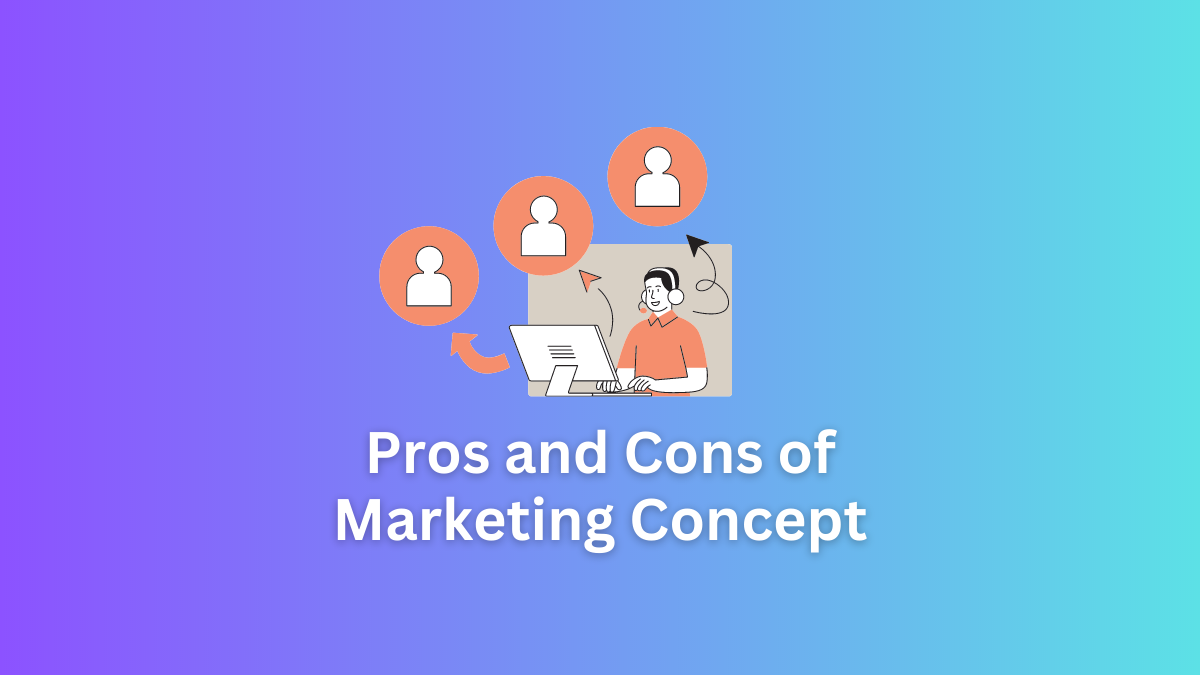Pros and Cons of Marketing Concept
A marketing concept refers to a marketing philosophy that emphasizes companies produce products that customers want and demand in the market. In simple words, it says to produce products that customers want, instead produce products that you want to sell.
Let’s explore some pros and cons of marketing concept in marketing.
Pros of a Marketing Concept
The marketing concept holds a significant of advantages that contribute to a business’s success and customer satisfaction. Here are the eight key advantages of a marketing concept.
Customer-Centric Approach
The marketing concept places customers at the heart of business decisions. By focusing on their needs and preferences, companies create products and services that genuinely resonate with their audience.
Related: 8 Pros and 7 Cons of Selling Concept of Marketing
Improved Product Development
Companies using this approach invest time in understanding what their customers truly want. This leads to the creation of products that are more likely to succeed in the market, reducing the risk of developing something that misses the mark.
Enhanced Customer Satisfaction
Meeting customers’ needs and desires result in happier customers. Satisfied customers are more likely to come back for repeat purchases and spread positive word-of-mouth, boosting the brand’s reputation.
Effective Resource Utilization
Concentrating efforts on a specific target market saves resources. Instead of trying to please everyone, businesses direct their resources toward creating value for their chosen audience, leading to more efficient marketing strategies.
Stronger Brand Loyalty
A focus on customer satisfaction leads to increased brand loyalty. Customers who consistently find value in a brand’s offerings become loyal customers, choosing that brand over competitors.
Long-Term Success
The marketing concept emphasizes building lasting relationships. This translates to long-term business success as companies nurture customer connections over time.
Also Read: 8 Pros and 7 Cons of Product Concept of Marketing
Adaptability to Changes
By staying attuned to customer needs, businesses remain adaptable. They can quickly adjust their offerings to match evolving market demands, ensuring they stay relevant.
Market Leadership
Implementing the marketing concept can lead to market leadership. As companies continuously deliver what customers want, they stand out in the market as leaders, setting trends and influencing the industry.
Cons of a Marketing Concept
While the marketing concept offers numerous advantages, there are also several drawbacks that companies should consider. Here are the 7 key disadvantages of the marketing concept.
Higher Costs
Focusing on customer needs and preferences can lead to higher production and marketing costs. Customizing products and tailoring marketing efforts to specific segments can be more resource-intensive.
Read Also: 8 Pros and 7 Cons of Production Concept of Marketing
Time-Consuming Research
In-depth research to understand customer desires takes time. This could delay product launches and marketing campaigns, giving competitors a chance to seize the market. In addition, along with increased time consumption, this time-consuming research also leads to higher costs.
Limited Innovation
Concentrating solely on existing customer needs might hinder innovation. Companies might miss out on creating groundbreaking products that customers didn’t even know they wanted.
Niche Market Limitation
Targeting a specific market segment can limit the business’s scope. This might lead to missed opportunities in other markets that could potentially bring in additional revenue.
Unpredictable Customer Behavior
Customer preferences can change unexpectedly, rendering previous research less relevant. Businesses may struggle to keep up with rapidly shifting trends.
Short-Term Focus
While building customer loyalty is a goal, it might not always translate into immediate profits. Businesses might face pressure to achieve short-term financial goals, leading to a conflict with the long-term approach of the marketing concept.
Overemphasis on Customer Input
Relying solely on customer feedback might limit a company’s ability to introduce innovative ideas. Businesses might become hesitant to take risks that could lead to breakthrough products.
Read Next: Product Vs. Production Concept of Marketing: 11 Differences
Arti Kushmi holds a BBS (Bachelor in Business Studies) degree and shares her business and marketing knowledge through this website. While not writing she will be reading and enjoying the moment.
